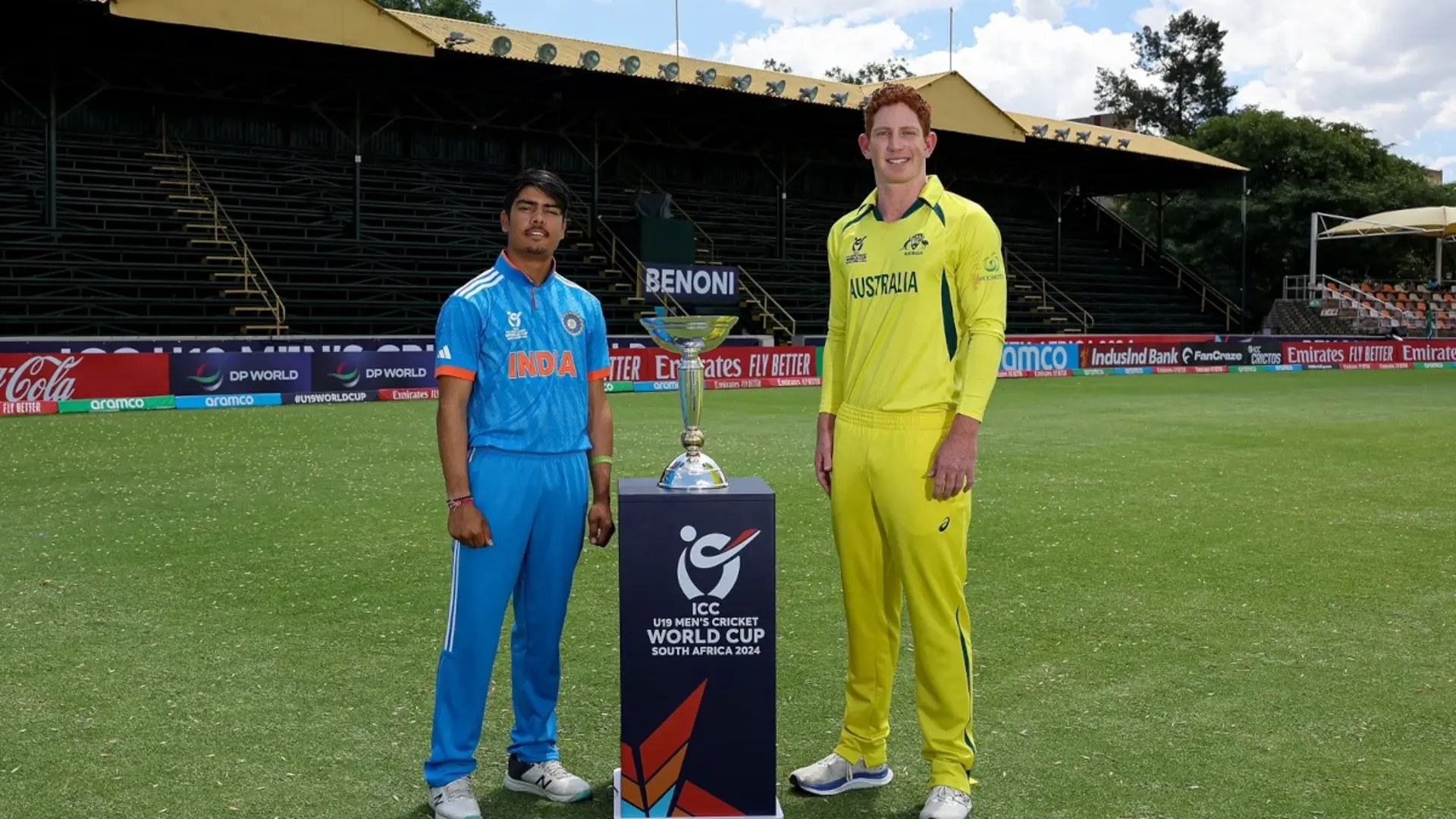History Beckons for Winners on the eve of U19 Men’s CWC 2024 Final

Just like in last year’s ICC World Test Championship Final and the ICC Men's Cricket World Cup final, India and Australia are set to clash in the showpiece finale of another landmark ICC tournament, this time at the ICC U19 Men’s World Cup 2024 in South Africa on Sunday.
Undefeated thus far in the tournament, both teams will stand on the brink of history as they take to the field in Benoni on 11 February.
Australia are aiming for a rare quadruple after clinching three major pieces of ICC silverware in the past year, which includes the two titles named above and the ICC Women’s T20 World Cup 2023, won twelve months ago on South African soil.
At stake for India meanwhile, is the prospect of a record-extending sixth ICC U19 Men’s CWC title, and their first successful defence of the crown. Amazingly, India are featuring in the fifth successive final at this event, and the defending champions will be keen to maintain their dominance at this event.
How they have fared so far
India
India dominated the early stages of the tournament, with commanding victories over Bangladesh, Ireland, and the USA, thanks to stellar performances from Saumy Pandey, Musheer Khan, and Naman Tiwari.
In the Super Six stage, Musheer Khan's second century set up a vital win against New Zealand, while Uday Saharan and Sachin Dhas starred with centuries in a big victory over Nepal.
The semifinal clash against South Africa posed a stern test for India, with the likes of Kwena Maphaka and Tristan Luus proving formidable. However, a resilient partnership between Saharan and Dhas once again steered India through a chastening trial, ensuring their place in the final.
This intense victory under pressure undoubtedly served as invaluable preparation for the young Indian unit ahead of the ultimate showdown against Australia in the final.
Team trends: India have been dominant batting first in the tournament, winning each of their first five games by setting up a target. Three of those five wins came by a margin of over 200 runs.
Australia
Hugh Weibgen’s Australian side navigated the group stage with varying levels of dominance, and importantly, different players have come to the fore at different stages in the competition.
Led by Callum Vidler, their pacers dominated Namibia, but they needed skipper Weibgen to save them from a difficult position and carry them to a win. Against Zimbabwe, Harry Dixon starred with the bat before Harkirat Bajwa's bowling dismantled the opposition. Rounding off their group stage fixtures, Ryan Hicks came to the rescue in their win against Sri Lanka that cemented their position atop the table.
In the Super Six stage, Weibgen's sensational century against rivals England set the tone for a dominant win in Kimberley. Next, despite a batting slip-up against West Indies, Sam Konstas' century helped Australia post a competitive total before rain intervened and helped them seal top spot in Group 2.
In the semifinals against Pakistan, Australia's batting faltered yet again after Tom Straker’s six-wicket haul had put them on top. Digging deep, they managed to scrape through by one wicket to set up a mouth-watering tie against India.
Team trends: Australia have endured shaky moments in each of their three run-chases in the tournament to date. Meanwhile, in the two games they batted first, they won by 225 and 110 runs respectively.
Key head-to-head battles to watch out for
Arshin Kulkarni v Callum Vidler
Callum Vidler has been Australia’s go-to bowler with the new ball, the pacer’s immaculate line and length posing trouble for top-order batters in the opposition ranks.
Arshin Kulkarni, notably, has struggled with seam movement early on in his innings, particularly outside his off-stump. Three of his dismissals in the tournament have come with edges behind to the wicketkeeper or the slip cordon.
Given Vidler’s skill with the new ball, the Australian will be a significant threat to the Indian opener, who hasn't quite set the tournament alight.
Sachin Dhas v Tom Straker
Coming off the back of 116 and 96 in the final Super Six game and semifinal respectively, Sachin Dhas is India's trump card. The batter, who began the tournament at No 7, is now India's mainstay in the middle order, but Kwena Maphaka exposed a minor weakness on a crumbling Benoni wicket with a slower delivery.
Change of pace hasn't quite sat well with Dhas this tournament, seeing him struggle with his timing. While Australia’s pace attack is known for extra zip and pace on the ball, Straker has been clever with his pace variations. The seamer is also coming into the showdown fresh from a six-wicket haul in the last game and can trouble Dhas.
The Indian batter has been prolific off his back foot in the tournament against the pacers and is likely India's key batter in the final against a strong Australia pace attack.
Hugh Weibgen v Saumy Pandey
Saumy Pandey has troubled both left and right-handers with his tight bowling through the middle overs in this tournament. Weibgen, meanwhile, has been Australia's pillar in the middle-order, but has a tough match-up coming in the final against India.
Weibgen was undone by left-arm spinners in three out of six innings in the tournament – Zimbabwe’s Ryan Simbi, England's Theo Wylie, and Sri Lanka’s Vishwa Lahiru, all left-arm orthodox spinners.
Saumy has been the best left-arm spinner in the tournament, and the prospect of facing him in the final will be a daunting one for the Aussie skipper.
Predicted XI
Australia
Harry Dixon, Sam Konstas, Hugh Weibgen (c), Harjas Singh, Ryan Hicks (wk), Ollie Peake, Tom Campbell, Raf MacMillan, Tom Straker, Mahli Beardman, Callum Vidler
India
Adarsh Singh, Arshin Kulkarni, Musheer Khan, Uday Saharan (c), Priyanshu Moliya, Sachin Dhas, Aravelly Avanish (wk), Murugan Abhishek, Naman Tiwari, Raj Limbani, Saumy Pandey.
Advertisement